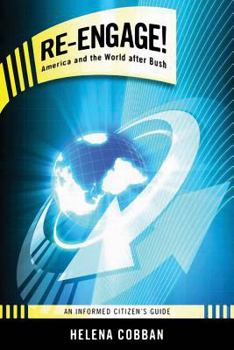Re-Engage!: America and the World After Bush: An Informed Citizen's Guide
A veteran international journalist gives us a concise, readable guide that provides a new vision for the United States in the global community. Since 9/11, the United States has pursued a foreign policy some have called a "control paradigm"-a unilateral domination of world affairs through military means that tries to keep the lid on insecurity without addressing root causes or protecting human rights. The Bush administration's energetic use of this approach has ripped the fabric of America's relationship with the rest of the world. In this concise guide, veteran journalist Helena Cobban proposes moving the United States away from the control paradigm to a policy of global inclusion. Global inclusion seeks to repair the U.S. relationship with other countries, recommit the United States to effective participation in the United Nations and other multilateral institutions, and ground U.S. foreign policy firmly in the principle of human equality. It also involves moving away from the language of threats and fear to a language of challenge and possibility. This book outlines how a global inclusion policy would address key challenges faced not only by Americans but by the 95 percent of humanity who are not Americans: - Challenges of terrorism and weapons proliferation. - Growing global inequality. - Rights abuses worldwide. - Climate change. - Shifting international power balances. Cobban reminds readers we do not need to do any of these things alone. Since 9/11, she has traveled to 18 foreign countries on four continents. She has heard how deep the desire is among people in China, sub-Saharan Africa, the Muslim world, Europe, and elsewhere for the United States to rejoin the world community on a sound and cooperative basis. In heartfelt, accessible prose with highly readable tables, graphics, websites, and other resources, she shows how we can re-engage as neighbors, as a country, and as a trusted international partner.
Format:Paperback
Language:English
ISBN:1594515522
ISBN13:9781594515521
Release Date:May 2008
Publisher:Routledge
Length:144 Pages
Weight:0.34 lbs.
Dimensions:0.3" x 5.1" x 8.0"
Customer Reviews
1 rating
Re-Engage a took kit for the future
Published by Thriftbooks.com User , 14 years ago
To coin an old country phrase, "George W. Bush left us in a devil of a fix": the economy is in shambles, we have a national debt that defies comprehension, we are involved in two wars which we entered in haphazardly and poorly managed with agenda other than the good of the American people, and an anti-government tone that spreads across the country whipped up by the Republican party and its so called conservatives. Ms. Cobban sets out to describe the present shape of American and its place in the world. In doing so she, like so many others before her, tries to break down subject/object dualism. Let me explain. Our world view is that each of us are individual beings, subjects, while everything, and every one, outside of ourselves is separate, objects. This is the dominate Christian Dogma. Another world view would be that we are all part of a big whole. We are all connected in one great big soul rather than each having a different and separate soul. This notion is nothing new: the Buddhists see it in their sense of "Oneness", The Gnostic Christians have the idea of "Enlightenment", Emmanuel Kant developed his "Transcendental Ego", Emerson wrote about "The Oversoul", Jung used his notion of "The Collective Unconsciousness" in his work, and William James talked about it in his theory of experience. "Global Control versus Global Inclusion" is the new paradigm. We as American need to stop seeing the world as something to go out and conquer but as something to circle around and view ourselves as an equal part of a greater whole. It compels us to take care of that "whole" as are taking care of ourselves at the same time. Attacking someone would theoretically be like deliberately shooting yourself in the foot. At bit of a stretch, but think about it. Or better yet, a starving child in the Sudan would be our child. As Ms. Cobban points out, the world that we are looking into is a great deal different than the world we left behind us. To the chagrin of the jingoists the United States is no longer the top dog. We blustered and squandered our way though the 20th Century, "The American Century". "Re-Engage" serves as a guide book for treading into the 21st Century. She outlines and describes topics from foreign affairs to world hunger, how we must address each of these to create a secure and peaceful world--inequality leads to dissention and ultimately war. War no longer is a consideration when you think about the devastating weapons in today's arsenal. In the book Ms. Cobban lays out and illustrates the eight goals of the United Nation's "World Millennium Development Goals". The last section is a listing of resources and toolkits for further exploration and action. A good and thoughtful read that will open your eyes challenge you to action.





